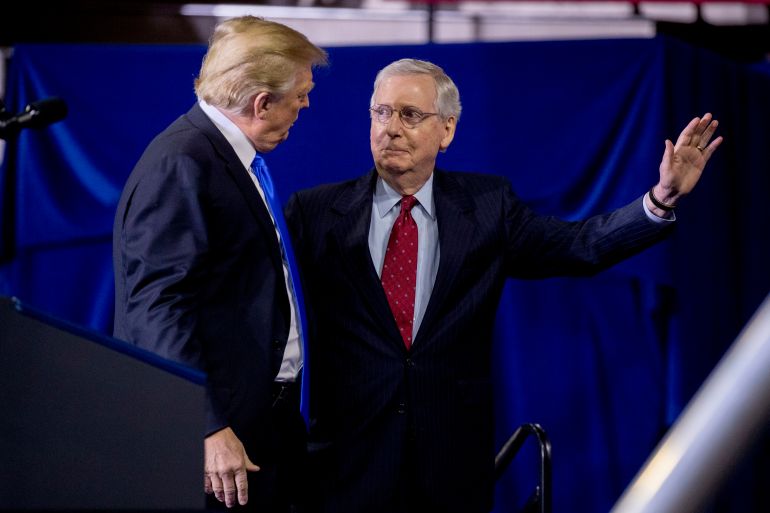Mitch McConnell’s big bet: Trump is not the future of the GOP
In an effort to set up the Republican Party for long-term success, he has magnified intraparty tensions.

For critics of Senate Minority Leader Mitch McConnell, his vote to acquit former President Donald Trump on a charge of inciting the US Capitol riot followed immediately by his vilification of Trump was nothing more than naked hypocrisy.
Before explaining his vote – that a former president “is constitutionally not eligible for conviction” – McConnell tore into Trump and his role in the riot.
Keep reading
list of 4 itemsTranscript: Mitch McConnell’s Trump impeachment speech
‘Political cowardice’: US reacts to Trump impeachment acquittal
Trump impeachment acquittal not end of legal troubles
“There is no question that President Trump is practically and morally responsible for provoking the events of that day,” McConnell said on Saturday. “Former President Trump’s actions that preceded the riot were a disgraceful, disgraceful dereliction of duty.”
A deeper look at McConnell’s actions reveals a more nuanced take: it is a premeditated long-game strategy to position the Republican Party – leaderless and facing internal strategic crises – for electoral success, albeit one that inflames the current infighting the party faces.
To be sure, McConnell was able to have it “both ways”, as some critics put it, because he is uniquely positioned to do so.
He does not have to worry about directly incurring the wrath of voters for his impeachment decision, having won re-election to another six-year term this past November. As the highest-ranking elected Republican in the federal government, one of his jobs is to signal to political donors and other Republicans who were spooked by the events of January 6 that there is some hope for the party post-Trump. And, perhaps most importantly, he does not seem to care much about being a lightning rod among anti-establishment Republican voters, having vanquished them many times before.
Pro-Trump wing backlash
Amid state and local Republican Party censures of those who voted to convict or to impeach Trump, there is a growing chorus of pro-Trump Republican voices who are not happy with McConnell and predict his remarks will be a liability for the party.
Calling McConnell’s speech “an outlier regarding how Republicans feel about all of this,” Senator Lindsey Graham, a staunch Trump backer, said the minority leader will be baggage for Republican candidates in next year’s midterms.
“He got a load off a chest obviously, but unfortunately he put a load on the back of Republicans,” Graham told Fox News on Sunday. “That speech you will see in 2022 campaigns,” he added.
Graham went even further about his belief that Trump is cemented as the de facto leader of the GOP suggesting Trump’s daughter-in-law, Lara Trump, was the “biggest winner” of the trial. There is speculation that she is considering running to replace retiring Republican Senator Richard Burr, who voted to convict, and Graham suggested Burr’s vote helps her, should she decide to run.
“I think she represents the future of the Republican Party,” Graham said.
At the moment, Graham may be onto something.
Polling continues to show Trump is viewed favourably by an overwhelming number of Republicans. In an Economist-YouGov poll released last week, 87 percent of Republicans have at least a somewhat favourable view of Trump, with 67 percent saying they have a very favourable view of him.
But McConnell knows all too well that the party’s success does not just rest solely on a fervent pro-Trump base.
Electoral calculus
For Republicans to win back control of Congress, McConnell keenly understands the pitfalls of playing to that base.
He watched as two Republicans in the battleground state of Georgia, under threat of presidential criticism, embraced Trumpism and proceeded to lose their runoff elections last month, handing control of the Senate to the Democrats.
He remembers all too well the number of establishment Republicans who 10 years ago lost primaries to extreme right Tea Party challengers, only to see those challengers lose in the general election to Democrats.
And he clearly sees all of that happening again if an emboldened Trump goes unchecked and remains the focus of Republican primaries next year and in the 2024 presidential race.
McConnell is betting Trump’s influence will fade due to a combination of supporter fatigue, Trump’s lack of a megaphone, and continuing legal issues potentially chipping away at his image among his supporters.
He is also banking on the tried-and-true posture for parties out of power: a unified resistance to the party in power. As Democrats were able to mask their internal fissures with a laser focus on Trump as a villain, Republicans will find they have more in common than not when it comes to opposing Joe Biden as the new president makes his mark politically and with his policies.
“Biden is giving Republicans plenty of ammo,” Republican strategist Scott Reed recently told The Wall Street Journal. “His continuing lurch to the left on domestic policy is creating a strong contrast for the midterm elections already.”
But as McConnell positions himself and his party for that potential unifying anti-Democratic Party focus, there are going to be many messy intraparty fights in the coming months – spurred on by Trump and his ardent backers – fights that will determine whether McConnell’s electoral gambit will be successful.
“I think there’s going to be a real battle for the soul of the Republican Party and the battle’s just beginning,” Republican Governor Larry Hogan, a frequent Trump critic, told NBC on Sunday. “And we’re going to figure out whether we’re going to be a party that can win elections or not.”